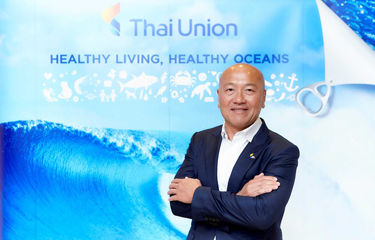Thai Union saw its profit rise to an all-time high in the second quarter thanks to strong performances from its frozen and chilled sales and its restaurant chain Red Lobster.
The company’s net income in Q2 2021 surged 36.5 percent year-on-year to THB 2.34 billion (USD 70 million, EUR 59.5 million), the highest quarterly profit level it has ever achieved.
The profit growth was attributed to “strong core three businesses, margin expansion, and a turnaround of Red Lobster at much lower loss,” Thai Union said in its Q2 results report, released 9 August.
Thai Union’s sales rose 8.6 percent year-on-year to THB 35.88 billion (USD 1.07 billion, EUR 911.7 million) between April and June, mainly thanks to a strong recovery in its frozen and chilled seafood sales – to THB 14.87 billion (USD 444 million, EUR 377.8 million) – up 28.7 percent year-over-year, following a 2020 Q2 impacted the COVID-19 pandemic. Its sales of pet care and value-added products reached THB 5.74 billion (USD 171.4 million, EUR 145.8 million), 12.5 percent higher year-on-year. The company said its sales in U.S. and were helped by rising COVID vaccination rates in these markets.
Thai Union’s profit was also supported by more robust shrimp and lobster sales and the strong performance of the U.S.-based restaurant chain Red Lobster, which Thai Union purchased in 2016 and invested further in last year. The chain benefited from a rebound in the foodservice sector in the U.S., with its losses narrowing to THB 49 million (USD 1.5 million, EUR 1.2 million) during the second quarter – much lower than THB 702 million (USD 21 million, EUR 17.8 million) it lost in Q2 2020, at the height of the pandemic.
However, in Q2, Thai Union’s losses from its investments in associated firms stood at THB 74 million (USD 2.2 million, EUR 1.9 million), though that total was down from THB 579 million (USD 17.3 million, EUR 14.7 million) a year earlier. And its ambient seafood sales declined 6.8 percent to THB 15.3 billion (USD 456 million, EUR 388 million) due to “mix[ed] performances” in major regions, the company said. Thai Union’s ambient seafood category, including tuna, sardine, salmon, mackerel, and herring, refers to shelf-stable items that are largely sold through retail and wholesale channels.
“The diversification in our business in terms of geographical markets, product categories, and source of revenues is a key contributor to our strong performance in this quarter, and we continue to focus on profitability, financial disciplines, and new, value-enhancing businesses,” Thai Union CEO Thiraphong Chansiri said.
The company’s strong performance came even as the Southeast Asia region was struggling to deal with the rapid spread of the coronavirus. Thai Union had to close its Songkla Canning plant in southern Thailand for two weeks ending 5 July after some of its workers contracted COVID-19. Production at the plant resumed on 5 July. The company’s Yueh Chyang Canned Food factory in Vietnam’s southern province of Long An was also shut on 12 July for five weeks after local authorities imposed strict lockdowns in response to a COVID-19 outbreak there. The plant is planned for reopening on 16 August. In December 2020, the company faced a number of COVID-19 infections at its plants in Samut Sakhon, Thailand, located west of Bangkok.
Apart from the pandemic, Thai Union said it is closely monitoring potential risks from a global container shortage, as well as higher costs for packaging and edible oils, that might negatively impact its business operations.
Despite challenges from the pandemic, the company is still pushing a plan to expand its offering of innovative products. In its Q2 announcement, Thai Union announced that its subsidiary, Thai Union Ingredients, has acquired 10 percent of stake in Clover Corporation, a tuna oil encapsulation company based in Australia. The acquisition served as part of Thai Union’s strategy to increase sales of DHA-rich products in Australia, Asia, and Europe.
Thai Union is also looking for other opportunities for partnership in alternative protein business in Thailand, following the recent collaboration agreement with V-Foods and the expansion of UniQTMDHA tuna oil range in Germany.
The company have invested in two food-tech start-ups, including ViAqua, a biotechnology company on disease prevention for aquaculture, and Aleph Farms, a cell-cultivated meat producer. The company may continue to expand further into the food-tech business, involving alternative protein, functional nutrition, and value-chain technology, it said.
In the first half of 2021, Thai Union’s sales rose 4.4 percent to THB 67 billion (USD 2 billion, EUR 1.7 billion). Its largest markets were the United States (42.4 percent of the total), Europe (28.6 percent), Thailand (10.8 percent), and Japan (4.8 percent). Its net profit jumped 51.7 percent to THB 4.1 billion (USD 122.4 million, EUR 104.2 million).
“While we remain optimistic about the outlook for the second half of this year and our ability to continue to grow strongly, we need to remain extremely vigilant as these are uncertain and unpredictable times and many challenges remain,” Chansiri said.
Thai Union is hoping to earn USD 5.2 billion (EUR 4.4 billion) in revenue by 2025 by focusing more on alternative proteins and food supplements.
Tha Union's net profit reached THB 6.25 billion (USD 208 million, EUR 17.2 million) in 2020, an increase of 64 percent from 2019. It reported just over THB 1.8 billion (USD 57.9 million, EUR 47.6 million) in profit in Q1 2021.
Photo courtesy of Thai Union







